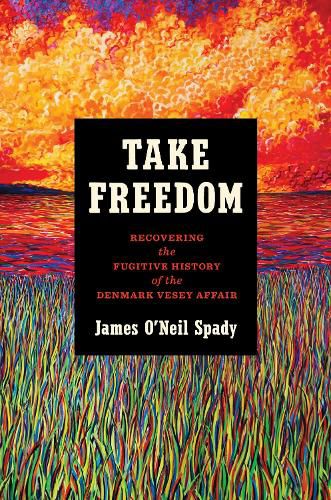Readings Newsletter
Become a Readings Member to make your shopping experience even easier.
Sign in or sign up for free!
You’re not far away from qualifying for FREE standard shipping within Australia
You’ve qualified for FREE standard shipping within Australia
The cart is loading…






In 822, Black Charlestonians attempted to overthrow slavery. They were exposed before they could strike, and many were tried and executed in what has come to be known as the Denmark Vesey Affair. Take Freedom reinterprets these events on the basis of new evidence and methods. James O'Neil Spady narrates the roles of a variety of Black men and women, arguing that the uprising was a broadly based, African-influenced social movement that marshaled radical love and fugitive practices of freedom to ignite a revolution that sought to liberate beloved friends, families, and communities from increasingly aggressive and racializing slaveowners.
Uncovering never-before-consulted, unpublished documents, Spady names the clerk who made the trial records and settles old arguments about their reliability. Take Freedom demonstrates the realism of the uprising movement's strategy and uses social network mapping to illustrate the social dynamics within the Black community, emphasizing the roles of women and relationships among enslaved people. Ultimately, this book offers a more inclusive and accurate portrayal of this pivotal yet understudied revolutionary movement.
$9.00 standard shipping within Australia
FREE standard shipping within Australia for orders over $100.00
Express & International shipping calculated at checkout
Stock availability can be subject to change without notice. We recommend calling the shop or contacting our online team to check availability of low stock items. Please see our Shopping Online page for more details.
In 822, Black Charlestonians attempted to overthrow slavery. They were exposed before they could strike, and many were tried and executed in what has come to be known as the Denmark Vesey Affair. Take Freedom reinterprets these events on the basis of new evidence and methods. James O'Neil Spady narrates the roles of a variety of Black men and women, arguing that the uprising was a broadly based, African-influenced social movement that marshaled radical love and fugitive practices of freedom to ignite a revolution that sought to liberate beloved friends, families, and communities from increasingly aggressive and racializing slaveowners.
Uncovering never-before-consulted, unpublished documents, Spady names the clerk who made the trial records and settles old arguments about their reliability. Take Freedom demonstrates the realism of the uprising movement's strategy and uses social network mapping to illustrate the social dynamics within the Black community, emphasizing the roles of women and relationships among enslaved people. Ultimately, this book offers a more inclusive and accurate portrayal of this pivotal yet understudied revolutionary movement.